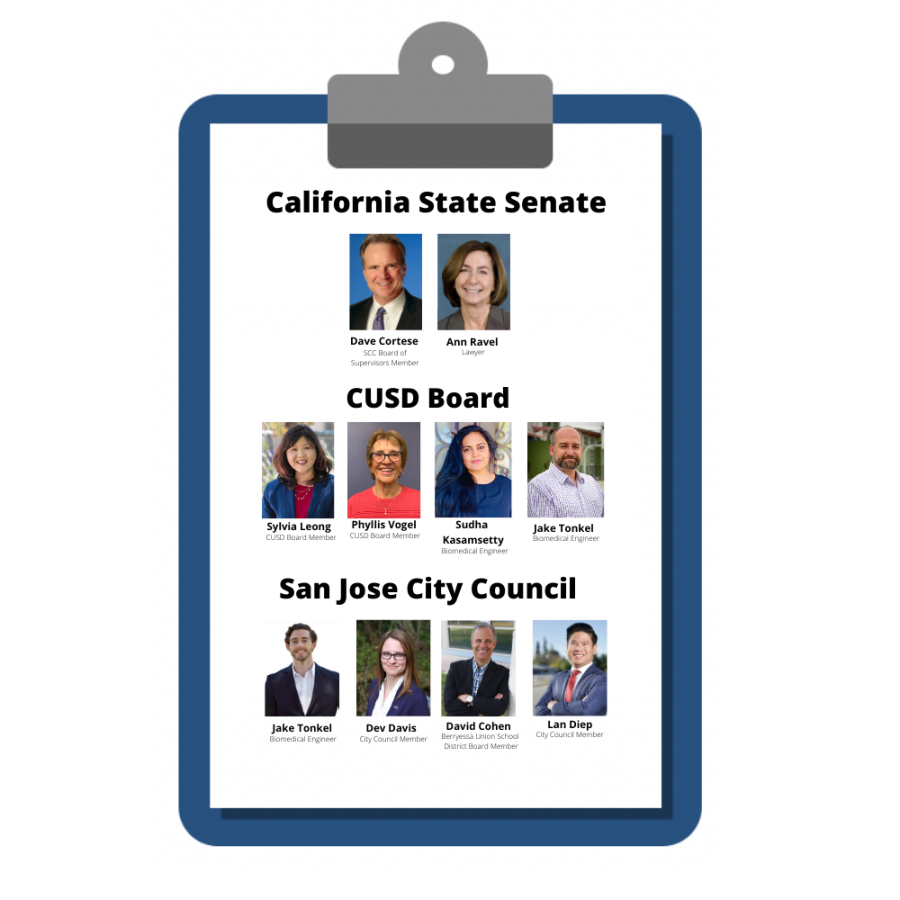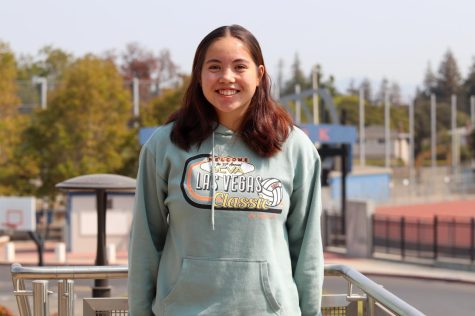Local elections begin for the City of San Jose
Graphic illustration by Mei Corricello
Here are the candidates for the local elections.
October 30, 2020
Although the 2020 presidential election has the nation’s attention, local election results may have a greater impact on citizens’ everyday lives. Among the many candidates and propositions on the Nov. 3 ballot this year, there is a state senate race, two positions on the San Jose City Council and two spots on the Cupertino Union School District (CUSD) board that will directly affect the Lynbrook community.
The most high profile local race is for District 15’s state senator, which recently opened up as current State Senator Jim Beall has served the maximum number of terms allowed. District 15 is much of Santa Clara County, including Cupertino, Los Gatos, Saratoga and parts of San Jose, and candidates Dave Cortese and Ann Ravel are currently vying to replace him. The California State Senate is the upper house of the California State Legislature and is in charge of determining the state budget and working with the governor to write and pass bills on public policy issues. Cortese and Ravel are both Democrats with similar policies, including progressive stances on the issues of affordable housing, education, climate change and healthcare.
They both have experience in public service: Ravel is a successful attorney and former Federal Election Commission chair, and Cortese has served on the Santa Clara County Board of Supervisors for more than 10 years. Each candidate also holds an impressive list of endorsements. Cortese has the support of the California Democratic Party, U.S. Representatives such as Ro Khanna and many other state and county officials, while Ravel has the support of former President Barack Obama and San Jose Mayor Sam Liccardo.
On Oct. 12, Ravel and Cortese participated in a debate hosted by the Almaden Valley Community Association. Both Ravel and Cortese marked COVID-19 recovery as a priority for them in the senate, pledging to help small business owners recover and fight for equal access to healthcare. Cortese, who oversees the Santa Clara County Public Health Department, praised the county’s response to the pandemic, but Ravel disagreed with the political aspects of its decisions, such as allowing the construction of affordable housing but not market-rate housing. The candidates also disagree on criminal justice reform; Ravel claims Cortese is too allied with police departments, but Cortese says his record reflects real reform. Ravel and Cortese hold different views on Proposition 15, which would increase commercial property taxes on businesses worth more than $3 million to fund K-12 schools. Cortese supports the proposition because it will greatly benefit public school students, but Ravel does not think the state should raise taxes on businesses, especially considering that they are already facing COVID-19.
When asked about themselves, Ravel emphasized transparency while Cortese stressed his experience in the local community, primarily his hometown of east San Jose. With more than 18 years combined of experience on the San Jose City Council and the Santa Clara Board of Supervisors, Cortese has a strong connection with the local community and is leading polls; however, with her county and national experience, along with Obama’s endorsement, Ravel hopes to pull off a victory.
Even closer to home is the race for two positions on the CUSD Board, which makes policies for CUSD and approves District expenditures. Challenging incumbents Sylvia Leong and Phyllis Vogel are Will Fluewelling and Sudha Kasamsetty. Leong and Vogel are running to retain their current positions on the board, while Fluewelling is running his second campaign for the spot and Kasamsetty is new to public service. All but Vogel are current CUSD or FUHSD parents and active volunteers themselves, and they believe the experience will benefit them.
Vogel is the longest-tenured member of the current board, having served on it for 13 years. Prior to her membership in the board, she also worked in the district for more than 40 years as a principal and superintendent. Her campaign emphasizes eventually transitioning back to in-person learning, making sure CUSD receives adequate funding and solving the prominent issue of declining enrollment.
Leong was appointed to the board in 2019 to fill the seat of Liang-Fang Chao who resigned to run for the Cupertino City Council. Now running to keep her seat, Leong stresses CUSD’s budget and presses for holistic learning, which includes creating a balanced education for every student that focuses on teaching students social and emotional skills and helping them learn from failure.
Despite losing an election for a CUSD board seat in 2018, Fluewelling is taking another shot in 2020. When asked by the Los Altos Town Crier what his strengths are, he mentioned his business background and new perspectives regarding budget issues. He also believes that CUSD should close down schools with declining enrollment, something the district has resisted to this point.
Kasamsetty, although new to public service, believes her experience from working with students can be of use on the Board. Because of her background as an engineer and a dance teacher, she aims to connect with parents and highlight her understanding of STEM and the liberal arts. She also hopes to solve budget issues by being transparent and seeking help from district parents.
As for city-wide decisions and policies, the San Jose City Council also has contested positions this year for District 4 and 6 representatives. Current Council Member Lan Diep is running against David Cohen for the chance to represent District 4, and current Council Member Devora “Dev” Davis is running against Jake Tonkel for the District 6 seat. Because San Jose has been a leader for progressive policies across the country, especially regarding climate change, the City Council impacts not only San Jose residents but also national-level decisions.
Diep ran for City Council for the first time in a 2015 special election, but he was not successful until he won his 2016 campaign and was elected to office. Now, Diep boasts impressive endorsements from San Jose Mayor Sam Liccardo and The Mercury News. During his time on City Council, he helped open Iris Chang park, build a flood pump to help communities below sea level and opened a Bay Area Rapid Transit station in Berryessa.
“I’m going to be focusing my second term on helping people safely get back to work,” Diep said. “I want to not only protect lives, but also livelihoods.”
If he is elected, he also wants to address housing affordability and increase civic engagement at the local level.
As for Cohen, this is his first time running for City Council after 13 years of serving on the Berryessa School Board. He considers his experience on the Board valuable and believes it helped him truly get to know the community and how to best serve it. Cohen has also been endorsed by a long list of public service leaders, including State Senator Beall.
“One big issue I’d like to address is climate change,” Cohen said. “I want to make sure [San Jose] is a leader in environmentally responsible development. For example, San Jose is one of the sunniest places in the world, and I think we should look at adding solar panels to more buildings.”
If he has the chance, he’d also like to address homelessness and housing issues, aid COVID-19 recovery and possibly facilitate the reopening of schools.
Davis has been on City Council since 2016, and during that time, she has helped make changes to speed up the permitting process for affordable housing and allocated a greater portion of the city’s funding to the lowest-income population. Davis has support from The Mercury News as well as three former District 6 representatives.
“I wanted to run for office because of my kids,” Davis said. “When I first ran, at the time of our last recession, [my kids] were young, and there were alot of city services that we used regularly, but they were declining at the time because of budget cuts. I wanted to make sure that didn’t happen again.”
If she is reelected, Davis wants to address issues of affordable housing, cleanliness, and public safety.
“I saw how challenging it was for City Council to pass policies that help working families, particularly because of how influential big money is in local politics,” Tonkel said. “If I’m elected, I think I can make a real change. My first priority is addressing the growing economic inequality in our city.”
Members of the school board, city council and the state senate, despite being very different levels of government, make local policies that affect every resident. Also, as California is relatively progressive compared to other parts of the U.S. and has a large population, city and state-wide decisions often spark national policy discussions. The ballot this year is full of candidates working hard to make a difference in their communities. Mail-in ballots were mailed to all registered California voters; to vote by mail, voters can complete and mail it out as long as it is postmarked before Nov. 3, or they can return it to a secure ballot drop box before 8:00 p.m. on Nov. 3. Although voting by mail is recommended for safety, in-person voting is also available and locations can be found online.


































































